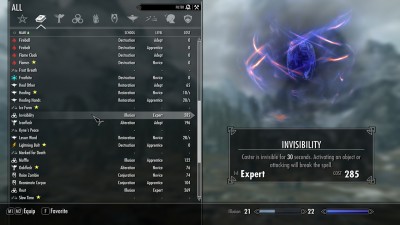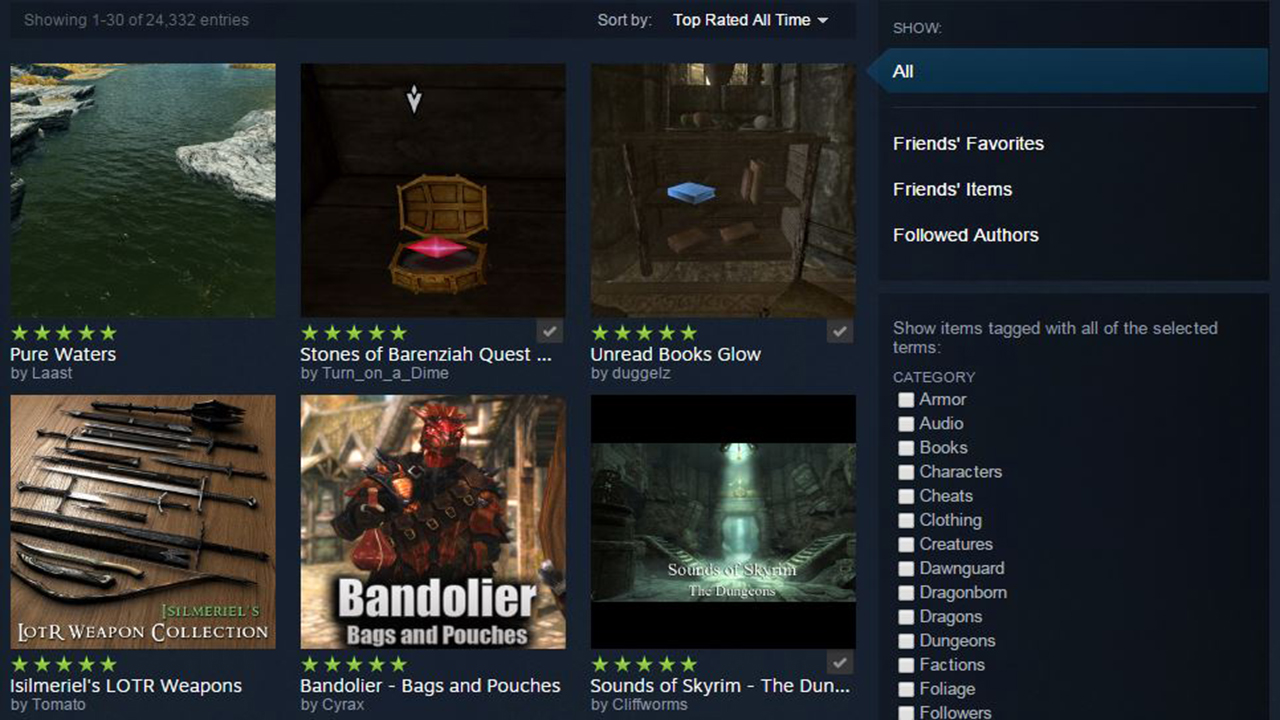There’s a discussion (nay, dare I call it an argument) that occurs in my house on a semi-regular basis surrounding one of the most popular and highly-modded games on PC - Bethesda’s wonderful open-world RPG, The Elder Scolls V: Skyrim.
The classic Morrowind might have the edge on the sheer number of mods currently available, though that may simply be due to the overwhelming sense of nostalgia for Bethesda’s pioneering Elder Scrolls work and the amount of time it’s been around.
Sites like Skyrim Nexus have been around for a while, and before the advent of the Steam Workshop, it was the place to get your mods. The modding community is huge, and the content they create range from a cosmetic skin re-texture, to the massive overhaul of an entire city or continent. Projects like Skywind take it to the next level, porting Bethesda’s beloved Morrowind into Skyrim‘s engine, and illustrating the depth and breadth of what the modding community can achieve.
So, here’s the argument: If the developers wanted it in the game, they would have put it in there; ergo, modding is cheating.
Valid point, perhaps. However, to counter the argument, one has to look at the reason behind why an individual decides to mod a “finished” game.
So let’s do that.
There are dozens upon dozens of reasons why a community of modders rise up to place their mark on a completed game. In Skyrim‘s case, the modder might feel that the weather effects (rain, snow, lighting, etc.) were sub-par, that perhaps the game’s potential was not realized due to being tethered to inferior console technology. Perhaps another feels that they can texture that stone to look 10 times more realistic. Yet another adds a few spells here and there, ones from previous titles that weren’t included but they feel should have been. Items like these, for the most part, tend to be cosmetic, and there are pages upon pages of re-skins, re-textures, contrast and saturation adjustments whose sole purpose is to make the realm even more gorgeous than it was from the beginning.
Personally, I’m a huge proponent of this type of modding, particularly in the case of SkyUI. This massive overhaul of the entire UI system is, arguably, the number one must-have for any PC Skyrim adventurer. Surely, it can’t be cheating if you’re simply improving on one of the ugliest and clunkiest UIs in gaming culture, right?

SkyUI takes the worst UI screens in history and gives players the most gorgeous inventories of all time.
Argument: But the developers didn’t design it that way; if they wanted to do it that way, they would have.
That, unfortunately, is a line of thought that I can’t get behind. It’s often a fresh set of eyes that notices the missing character of code, or the glaring absurdity of a design flaw. Since the community traditionally doesn’t get involved until after the product has been worked on for who-knows-how-many-years (something which is slowly changing now, in an age of Steam Early Access and Kickstarter campaigns), it’s more than likely that the development team wrote their way into a corner and wouldn’t have realized how to better illustrate their design without input from the outside.
Argument: Well, what about mods that do break the game in some way?
Enter mods like Lycanthropy and Vampirism Potions, Faster Leveling, or the Stones of Barenziah Quest Markers (which makes a lengthy, difficult, game-spanning quest take only a few hours). Yes, these could be (and are, by many) considered cheating. By installing and running these tweaks, you’re subverting the original game design and making something massively time-consuming and difficult take very little time at all - or allowing yourself to enjoy both sides of an either-or choice at will (i.e. I want to be a vampire for a bit, now a werewolf, now a regular ol’ Nord again!).
Fair enough, but let me counter with this: The above mentioned mods, and any others in a similar “game-breaking” vein feel much less damaging than hitting the tilde key to open the Console Command box. Enter true cheating: adding that perk point, unlocking that Master locked chest, or filling your pocket with 25k worth of gold before you’ve even set foot out of Helgen is, personally, the real game breaker here.
There is a disconnect here between cheating and modding which is my whole counterargument to “modding is cheating.” Yes, some mods make it easier to achieve X, and some mods add Y to the game that wasn’t originally intended, but is that truly cheating? No, no I don’t think so. Of course, some of the comment streams in the Workshop can be downright vitriolic (which should be no surprise, really), as to whether or not said mod breaks immersion or realism or whatever the argument against it is.
Me? I like my re-textures, re-skins, and “prettifying” mods, which, from a quick glance at the “Top Rated of All Time” Workshop mods, take up about 97% of that list. Want to add that missing race or spell? Install a mod. Want to make it easier to level? Install a mod. Want to run around nekkid with all your dangly bits hanging out? Go ahead, use a mod. The openness of Bethesda’s game to the modding community has undoubtedly been responsible for the game’s massive - and ongoing - popularity on PC, with everything from sidequests to total conversions being added to the already-significant content of the original game.
But if you want to cheat? Take my advice - use the Command Console.



